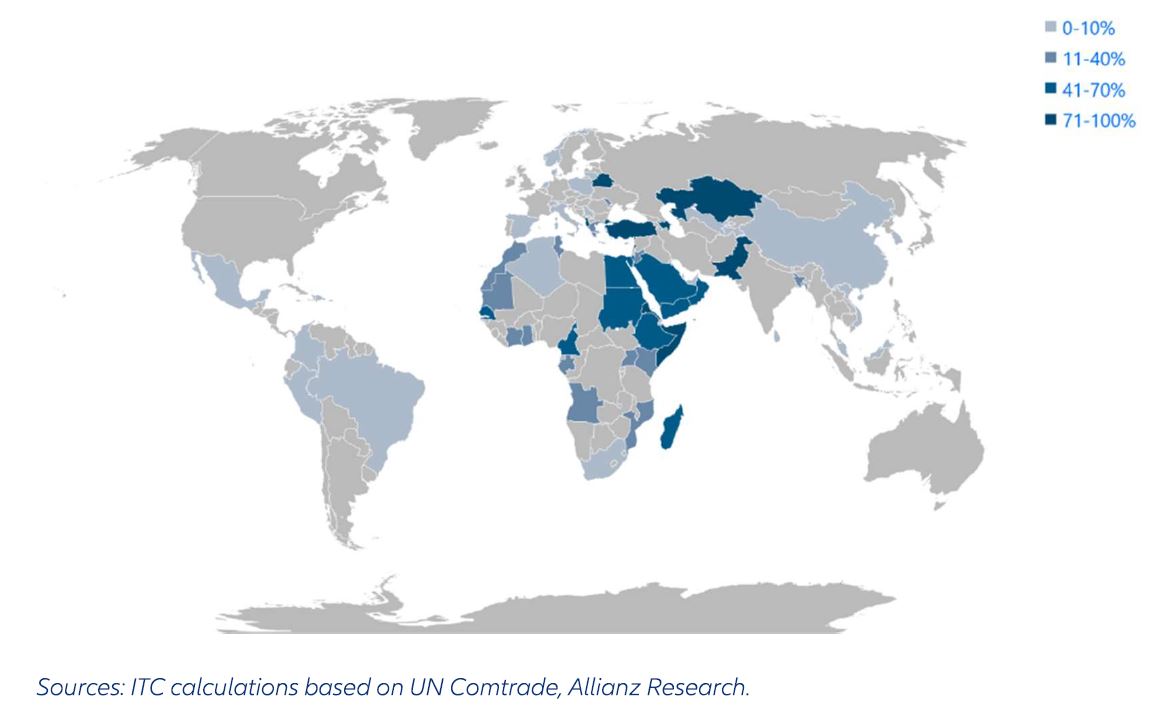The spring of discontent: global food crisis and the potential for civil unrests
A multidimensional crisis
Soaring energy prices have also exacerbated the current crisis by making it more expensive to produce fertilizers and to run farm equipment. Russia is the world’s top supplier of certain fertilizers and natural gas. While fertilizers are not subject to sanctions, sales are disrupted by measures taken against the Russian financial system. In addition, China’s restriction on its fertilizer exports and trade sanctions make higher grain production less likely in other parts of the world. As a result, food is now over 56% more expensive than at the end of 2019 and oils have soared to 2.3 times the price that they were in December 2019.
In the recently published annual Global Report on Food Crises (GRFC 2022), which includes the coordinated contribution of 17 agencies under the direction of the Food Security Information Network (FSIN), UN Secretary General António Guterres stated that “the war in Ukraine is supercharging a three-dimensional crisis—food, energy, and finance—with devastating impacts on the world’s most vulnerable people, countries, and economies.”

Balancing act: strategies for stability
COVID-19’s impact on some of the poorest households, the continuous rise of hunger and malnutrition, limited capacities of governmental support for households, and uncertainty over the duration of current supply shocks make this current spike in food prices more challenging to tackle.
Though higher prices are experienced in all countries, it is the ones depending on imports that will face the strongest consequences. In Turkey, according to the report, where food consumption accounts for 25.3% of total consumption, the food Consumer Price Index (CPI) has increased by 425% year-on-year. This means that in the absence of government intervention or a change in consumption habits, households would have lost 100% of their purchasing power.
Argentina, Brazil, and Egypt will also feel the crisis given the high proportion of food consumption as a percentage of total consumption and the high domestic food prices.
Several countries have already announced measures to counteract inflation, including cutting taxes, cash transfers, subsidies, and even price controls. Nonetheless, many of these actions can carry large fiscal costs and unintendedly increase the global imbalances in supply and demand. Governments also need to be cautious in withdrawing pandemic support, especially for the poorer households and in the context of inflation.
11 countries facing a high risk of food-related unrest
Emerging Markets and Developing Economies (EMDEs) are particularly concerned with the global food price shock since they often have limited capacity to replace food imports with substitutes.
Adjustments to the price shock could then lead to lower food availability and raise the risk of civil unrest. Allianz Research identified 11 larger emerging markets that face a high risk of food-related unrest in the next few years: Sri Lanka, Algeria, Bosnia and Herzegovina, Egypt, Jordan, Lebanon, Nigeria, Pakistan, the Philippines, Tunisia, and Turkey.
There are also some countries with only a small food-trade surplus that could face a moderate risk of food-related unrest. Colombia, Mexico, Peru, Kenya, Morocco, and South Africa were receiving a significant or a high share of wheat imports from Russia and Ukraine in the past few years and may struggle to replace wheat imports with appropriate substitutes. This situation could consequently lead toward a lack of basic food items such as bread in the next year or so.
Battling the infodemic storm
Recent findings from the Edelman Trust Barometer 2022 show that businesses and NGOs are perceived as competent and effective drivers of positive change, able to respond to crises with flexibility and innovation. Against the backdrop of economic, societal, and geopolitical turmoil, matters of trust have become crucial in securing societal stability.
But even businesses and NGOs face an infodemic storm, as Edelman and others named it. Misinformation, disinformation, fake news, deep political polarization, and propaganda (to name a few) mislead the public and undermine efforts to curb the crises. When lives and livelihoods are at stake, such problems become even more exacerbated.
According to Allianz Global Corporate & Specialty's (AGCS) recent expert risk assessment analysis, social media’s influence is likely to play a role in fueling civil unrest for the foreseeable future. Unrest also carries a risk of material damage to buildings and assets, business interruption, denial of access or loss of attraction.
“Civil unrest increasingly represents a more critical exposure for companies than terrorism,” says Srdjan Todorovic, Head of Global Political Violence & Hostile Environment Solutions at AGCS. “The nature of the threat is evolving, as some democracies become unstable, and certain autocracies crack down heavily on dissenters. Unrest can occur simultaneously in multiple locations as social media now facilitates the rapid mobilization of protestors.’’
“Where we currently stand, I don’t expect incidences of social unrest to abate any time soon, given the after-shocks of Covid-19, the looming cost-of-living crisis, and the ideological rifts that continue to divide societies around the world,” adds Todorovic. “We’re seeing rising interest from risk managers in specialist cover for political violence, as some traditional property and casualty insurers have stepped back from the exposures associated with Strikes, Riots and Civil Commotion (SRCC) insurance. The standalone market is also having a rethink on war-like perils, as well as the coverage extensions that were offered freely only a few months ago.’’


